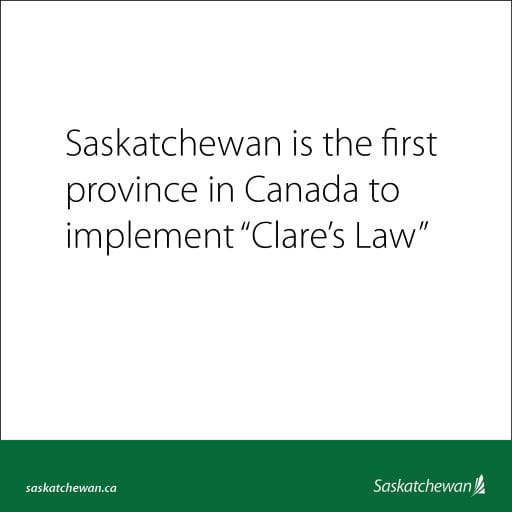Released on June 29, 2020
Today, The Interpersonal Violence Disclosure Protocol (Clare’s Law) Act will come into force in Saskatchewan.
“Clare’s Law” authorizes a police protocol to disclose risk information related to someone’s violent or abusive past to intimate partners whose safety may be threatened.
The Interpersonal Violence Disclosure Protocol created under the Act sets out a framework and standard process for the disclosure of information. The information can be disclosed to applicants who believe they may be at risk from an intimate partner (“right to ask”), and to persons identified by police to be at risk (“right to know”).
“We are proud to be the first jurisdiction in Canada to enact Clare’s Law legislation and look forward to other provinces doing the same,” Justice Minister and Attorney General Don Morgan said. “If this legislation helps protect even just one person, it’s a success.”

The Ministries of Justice and Attorney General, and Corrections and Policing, worked in conjunction with the Provincial Association of Transition Houses (PATHS) and the Saskatchewan Association of Chiefs of Police (SACP) to create and approve the Interpersonal Violence and Disclosure Protocol.
“We applaud the government of Saskatchewan for being the first jurisdiction in Canada to introduce Clare’s Law,” PATHS Executive Director Jo-Anne Dusel said. “By encouraging law enforcement agencies to share risk information with potential victims and giving an opportunity for those at risk, and, the people who care for them, to ask for information about the past history of violent behavior of a new or potential partner, Clare’s Law takes a proactive approach to preventing intimate partner violence.”
“Reducing and preventing intimate partner violence through collaborative partnerships continues to be a policing priority,” Moose Jaw Police Service Chief Rick Bourassa said. “This legislation creates an additional framework for police services to participate in this multifaceted approach to enhancing safety for everyone in our communities.”
The Government of Saskatchewan is focused on reducing and preventing domestic violence through ongoing collaboration with provincial partners and other ministries. In 2020-21, the Ministries of Justice and Attorney General, and Corrections and Policing, will provide more than $21.5 million in funding for prevention and intervention services, including funding domestic violence transition houses, sexual assault centres and family outreach services.
-30-
For more information, contact:
Marieka Andrew
Justice
Regina
Phone: 306-787-5510
Email: marieka.andrew@gov.sk.ca

